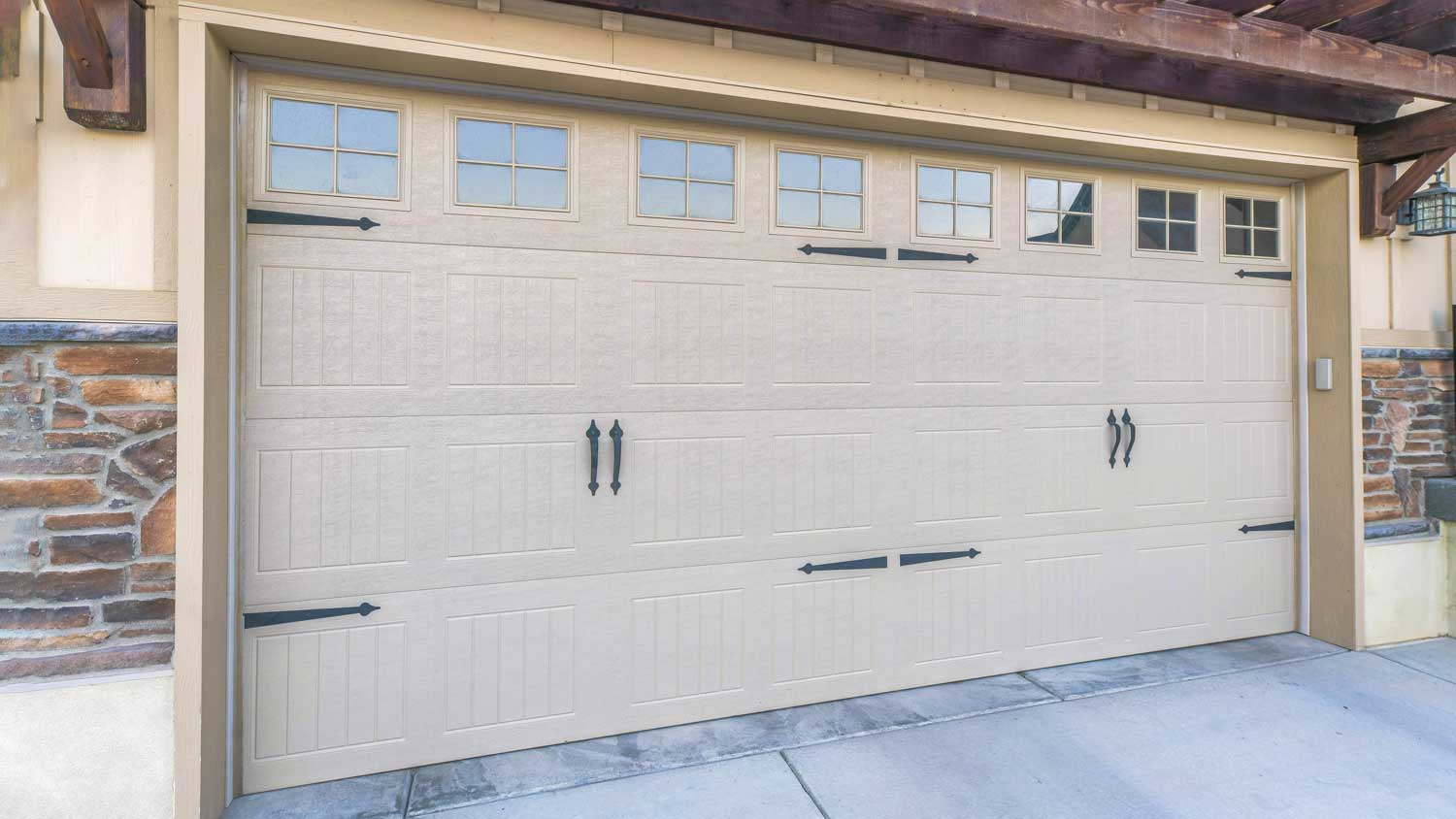Can You Install a New Garage Door on Old Tracks?
Get on track with the facts before installing a new garage door


If you're investing in a new garage door, you may be wondering if you can install a new garage door on old tracks to save on other parts of your garage door system. Skimping on a set of new garage door tracks could cost you more in the long run. So, to ensure your garage door operates safely and adds to your curb appeal, we’ve rounded up the benefits of swapping out those old garage door tracks before installing a new garage door.
Reasons You Can’t Use the Old Tracks for a New Garage Door
While planning a new garage door installation, switching out the old tracks for new and improved ones may not be the first thing that comes to mind. However, reusing old tracks can pose several problems—some of which can lead to injury or structural damage to your home. Below are four cons to using old tracks for a new garage door.
Safety Concerns
Safety is no joking matter when it comes to your garage door. A good garage door opener can make a garage door seem almost weightless, but in reality, garage doors are extremely heavy and can even be fatal if they were to go off track due to a dinky, old track.
Garage doors weigh between 100 and 300 pounds on average. If your old tracks are rusty, corroded, bent, or in some other way compromised, this increases your new door’s likelihood of malfunctioning and crashing down. This can be detrimental to your pets or loved ones.
Property Damage Concerns
For the same reasons that compromise your safety, an off-kilter garage door track can cause your new garage door to slam down on your car, garage, or property. Garage door repair costs range from $50 to $350 on average, while garage door replacement costs range from $500 to $2,000.
Add the cost to repair your car and other sections of your garage door’s frame or your property, and you may have a hefty bill that could have been prevented by simply replacing the old garage door track.
Void Garage Door Warranty
Your new garage door typically comes with a manufacturer's warranty that's good for one to five years—but this could come with a catch. A garage door that uses a garage door track that isn't compatible with the garage door or isn’t purchased from the same garage door manufacturing company can void the warranty if your garage door becomes damaged as a result of the garage door tracks. You’ll end up paying out of pocket for any repairs if this happens.
Compatibility with the New Garage Door
Lastly, every garage door comes with its own track system. Manufacturers can use different thicknesses, weights, lengths, widths, and more to cater to that specific garage door and rollers. This applies even to garage doors from the same manufacturer, as companies alter the specs over time and based on the dimensions of your new door.
In choosing to reuse outdated tracks, you may find that your garage door is incompatible with the old tracks, even if you use the same brand.
Garage door tracks that are incompatible with the new garage door can:
Cause the garage door to get stuck or fall
Wear down your garage door opener as it strains to operate the door
Bend or break the track
Lead to injury or property damage
Increase expenses as you repair any damage and replace worn down parts
Benefits of Using New Garage Door Tracks

After waving goodbye to your old garage door tracks, you’ll want replacement garage door tracks that are compatible with your new garage door. Investing in new garage door tracks can set your new garage door up for success. Below are three ways that using new garage door tracks can benefit your home.
Noise Reduction Compared to the Old Track
There is nothing quite like waking up in the morning to the sound of a family member opening a garage door that's rolling across cranky, old tracks. Even if you forgo a chain belt garage door opener in exchange for a quiet type of garage door opener, your garage door will perform an unpleasant solo every time it drags across an old track.
Choosing a new garage door track can help silence your garage as it makes its way up and down the track, creating a more peaceful atmosphere in your home.
Garage Door Will Open and Close Smoother
There's nothing quite like a rust-free, straight, and properly lubricated track when it comes to your garage door’s smooth operation. A new garage door track and rollers can make your garage door glide across the tracks like an ice skating champion rather than like a rickety gravel road—or worse, a garage door that won’t close or open when you’re in a hurry to beat rush hour.
Not to mention, this smoother operation could increase the lifespan of your garage door and garage door opener.
Improve the Home’s Resale Value
Curb appeal matters. It matters so much that, according to a Cost vs. Value report conducted by Remodeling, replacing your garage door offers a 98.3% return on investment (ROI). This ROI can either increase as a result of shiny, new garage door tracks or it can decrease with old, rusted tracks. Homeowners with a keen eye will feel safer as they tour your home during an open house when they see a safe-looking garage door system.
Frequently Asked Questions
Expect to pay between $45 and $150 for new garage door tracks, not including the installation. The price depends on the brand and how much track material you need for your garage door. Though you can install new garage door tracks yourself, you might want to work with a garage door installer near you to install them correctly.
Garage door tracks have a lifespan ranging from 10 to 30 years on average. Proper garage door maintenance can extend the lifespan of your garage door tracks. Meanwhile, poorly maintained garage doors could have a lifespan of less than 10 years. Be sure to lubricate your garage door tracks every six months to make the most out of your garage door.





- Garage Door Installation Tips Every Homeowner Should Know
- 11 Essential Tips for Buying a Garage Door
- 10 Garage Door Maintenance Tips for Maximum Longevity
- What Are All the Parts of a Garage Door?
- Who Do You Hire to Fix or Install a Garage Door?
- Convert Garage Door to Entry Door
- Why Your Garage Door Won’t Stay Closed and What to Do About It
- Standard Garage Door Sizes and How to Pick the Right One for Your Home
- Why Your Garage Door Won’t Close and What to Do About It
- What to Do if You Backed Into Your Garage Door










